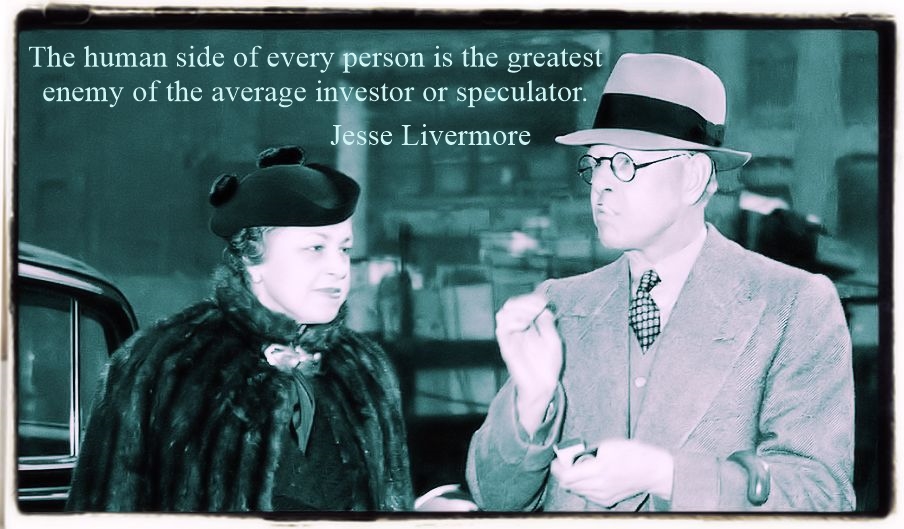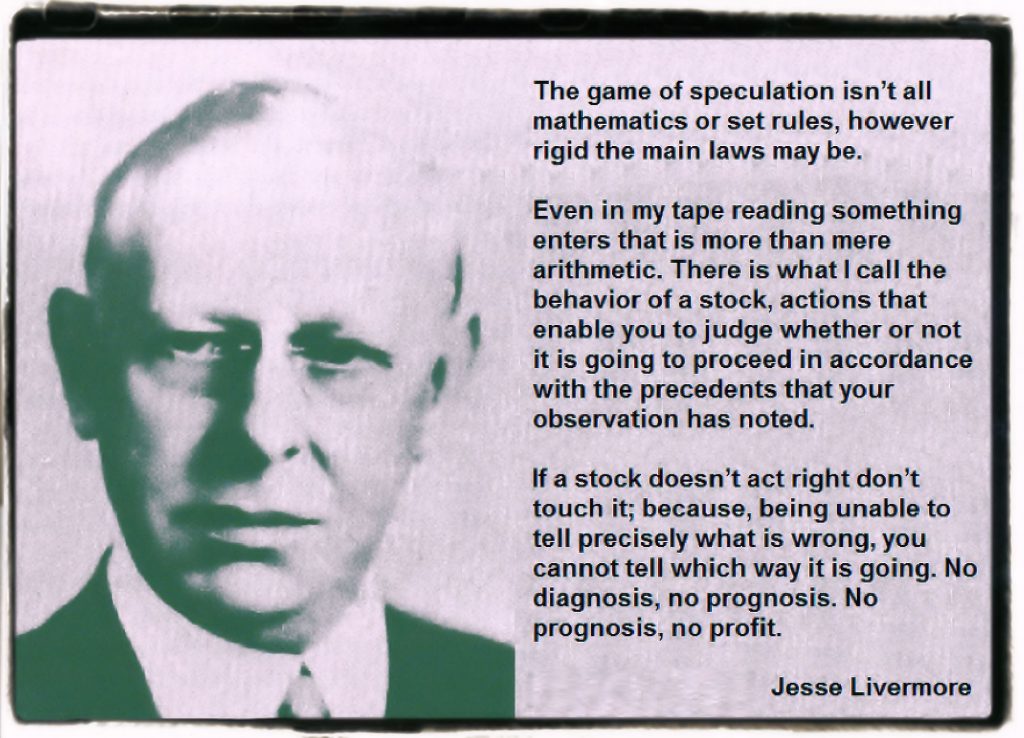
Jesse Livermore’s 21 Famous Trading Rules with an introduction to his biography and his trading life philosophy.
A trading philosophy is something that cannot just be transferred from one person to another; it’s something that you have to acquire yourself through time and effort.
Richard Driehaus
My sense of insecurity keeps me alert, always ready to correct my errors.
George Soros
To anticipate the market is to gamble. To be patient and react only when the market gives the signal is to speculate.
Jesse Livermore
Introduction
In 1929 Jesse Livermore’s fortunes were at their zenith. He had made a profit of $100 million dollars shorting the markets during the great crash. Yet, by 1934, he was bankrupt. In just five short years one of the greatest stock-traders the world has known lost his entire $100 million fortune.
We cannot blame this on the inadequacy of his trading rules – they were fully formulated by then. We must conclude that he ignored at least one of his sacrosanct rules – never to hold on to a losing position.
If Livermore did hold losing positions until his $100 million fortune was wiped out – in spite of the lessons of 41 years of trading – we must presume his mental processes had malfunctioned, due either to stress, depression, or a combination of the two.
Twelve years earlier, Livermore had told Lefèvre how he had put money in trust for his family. Lefèvre had asked if this was because Livermore feared that the stock market might take his money away from him.
Livermore replied prophetically: “I know this – that a man will spend anything he can lay his hands on; and that he can lose every cent.”
Jesse Livermore concluded that no trader could trade the market constantly and beat it. Everyone who played the market daily would eventually lose. Winning was only possible by trading at times when the market allowed one to win – during clear bull and bear markets when most stocks were moving in a single direction.
Failure to wait (for the Pivotal Point to be passed). There were two basic reasons. First, I lacked the patience to wait until the psychological time had arrived, price wise, to begin my operation. I had known that if cotton ever sold up to 12.5 cents a pound it would be on its way to much higher prices. But no, I did not have the will power to wait.
I though I must make a few extra dollars quickly, before cotton reached the buying point, and I acted before the market was ripe. Not only did I lose around $200,000 in actual money, but a profit of $1,000,000. For my original plan, well fixed in mind, contemplated the accumulation of 100,000 bales after the Pivotal Point had been passed. I could not have missed making a profit of 200 points or more on that move.
Jesse Livermore
At the beginning of the move there should be an unusually large volume of shares traded. Prices should move generally in one direction (upwards or downwards) for a few days.
A normal reaction should be observed – volume will decrease compared with the volumes observed during the initial trend, and the price may move against the trend somewhat. Within a day or two of the normal reaction, volume should increase again and the price trend should be resumed.
Provided this pattern is repeated, it is safe to stick with a trade. If there should be a deviation from the pattern, it is a warning sign. If the pattern fails and the price moves against the trend by more than a little, it is a sign to exit your trade and preserve your profit.
Jesse Livermore

Jesse Livermore’s 21 Trading Rules
1. Nothing new ever occurs in the business of speculating or investing in securities and commodities.
2. Money cannot consistently be made trading every day or every week during the year.
3. Don’t trust your own opinion and back your judgment until the action of the market itself confirms your opinion.
4. Markets are never wrong – opinions often are.
5. The real money made in speculating has been in commitments showing in profit right from the start.
6. As long as a stock is acting right, and the market is right, do not be in a hurry to take profits.
7. One should never permit speculative ventures to run into investments.
8. The money lost by speculation alone is small compared with the gigantic sums lost by so-called investors who have let their investments ride.
9. Never buy a stock because it has had a big decline from its previous high.
10. Never sell a stock because it seems high-priced.
11. I become a buyer as soon as a stock makes a new high on its movement after having had a normal reaction.
12. Never average losses.
13. The human side of every person is the greatest enemy of the average investor or speculator.
14. Wishful thinking must be banished.
15. Big movements take time to develop.
16. It is not good to be too curious about all the reasons behind price movements.
17. It is much easier to watch a few than many.
18. If you cannot make money out of the leading active issues, you are not going to make money out of the stock market as a whole.
19. The leaders of today may not be the leaders of two years from now.
20. Do not become completely bearish or bullish on the whole market because one stock in some particular group has plainly reversed its course from the general trend.
21. Few people ever make money on tips. Beware of inside information. If there was easy money lying around, no one would be forcing it into your pocket.
To find out more about trading and finance you can also read:
Jesse Livermore trading lessons
